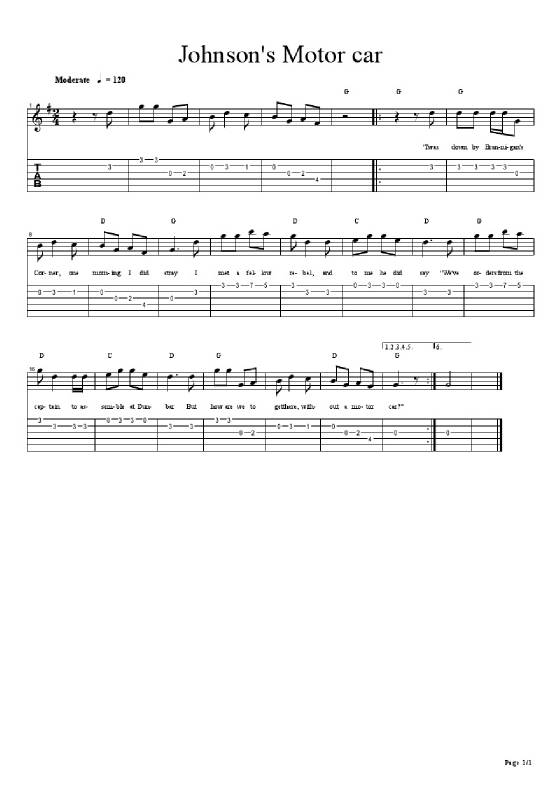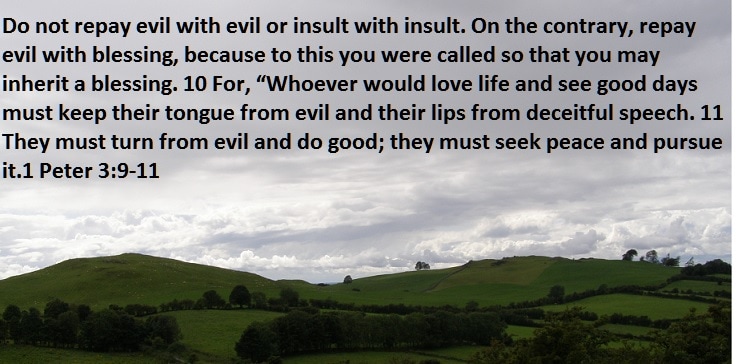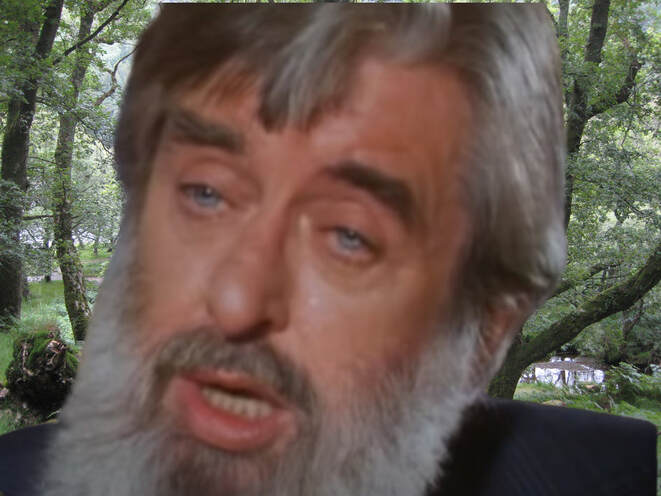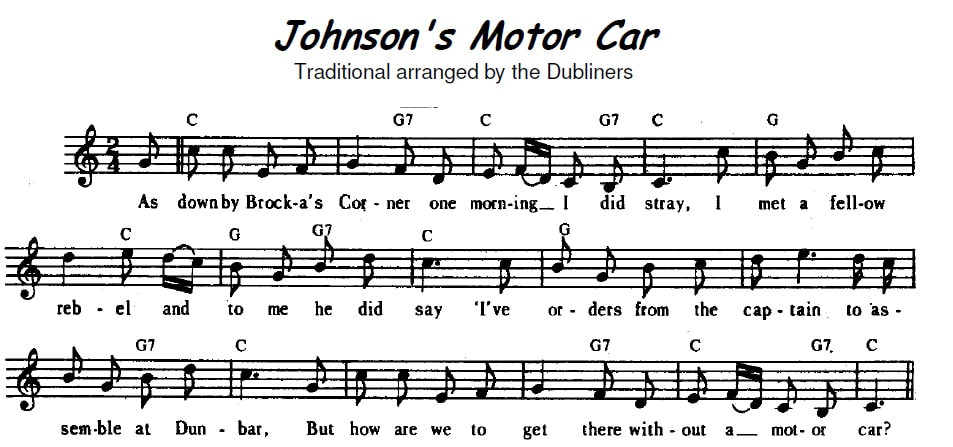Johnsons Motorcar Lyrics And Chords
The youtube video of this Irish folk song is by The Dubliners.Written by William Gillespie. A true story ? . recorded by The Dubliners and The Clancy's. I have given the guitar chords in chordpro in the same key as the way The Dubliners play the song, which are slightly different that my version of the chords. The sheet music notes are included.
Twas [G] down by Brannigan´s Corner, one morning I did stray.
I met a fellow rebel, and [D] to me he did say,
"We´ve [G] orders from the captain to assemble at Dunbar,
But how are we to get there, [D] without a motor [G] car?"
"Oh Barney dear, be of good cheer, I´ll tell you what we´ll do.
The specials they are plentiful, the IRA are few,
We´ll send a wire to Johnson to meet us at Stranlar
And we´ll give the boys a bloody good ride in Johnson´s Motor Car"
When Dr. Johnson heard the news he soon put on his shoes
He says this is an urgent case, there is no time to lose,
He then put on his castor hat and on his breast a star
You could hear the din all through Glenfin of Johnson´s Motor Car
But when he got to the railway bridge, some rebels he saw there
Old Johnson knew the game was up, for at him they did stare
He said "I have a permit, to travel near and far."
"To hell with your English permit, we want your motor car."
"What will my loyal brethren think, when he hear the news,
My car has been commandeered, by the rebels at Dunluce."
"We´ll give you a receipt for it, all signed by Captain Barr.
And when Ireland gets her freedom, boy, you´ll get your motor car."
Well we put that car in motion and filled it to the brim,
With guns and bayonets shining which made old Johnson grim,
And Barney hoisted a Sinn Fein flag, and it fluttered like a star,
And we gave three cheers for the IRA and Johnson´s Motor Car.
I met a fellow rebel, and [D] to me he did say,
"We´ve [G] orders from the captain to assemble at Dunbar,
But how are we to get there, [D] without a motor [G] car?"
"Oh Barney dear, be of good cheer, I´ll tell you what we´ll do.
The specials they are plentiful, the IRA are few,
We´ll send a wire to Johnson to meet us at Stranlar
And we´ll give the boys a bloody good ride in Johnson´s Motor Car"
When Dr. Johnson heard the news he soon put on his shoes
He says this is an urgent case, there is no time to lose,
He then put on his castor hat and on his breast a star
You could hear the din all through Glenfin of Johnson´s Motor Car
But when he got to the railway bridge, some rebels he saw there
Old Johnson knew the game was up, for at him they did stare
He said "I have a permit, to travel near and far."
"To hell with your English permit, we want your motor car."
"What will my loyal brethren think, when he hear the news,
My car has been commandeered, by the rebels at Dunluce."
"We´ll give you a receipt for it, all signed by Captain Barr.
And when Ireland gets her freedom, boy, you´ll get your motor car."
Well we put that car in motion and filled it to the brim,
With guns and bayonets shining which made old Johnson grim,
And Barney hoisted a Sinn Fein flag, and it fluttered like a star,
And we gave three cheers for the IRA and Johnson´s Motor Car.
Here are the guitar chords as played by The Dubliners in the youtube video
Twas [G] down by Brannigan´s [D]Corner, one morning I did [G]stray.
I met a fellow rebel, and [D] to me he did say,
"We´ve [G] orders from the captain to a[C]ssemble at Dun[G]bar,
But how are we to [D]get there, without a motor [G] car?"
"Oh [G]Barney dear, be of [D]good cheer, I´ll tell you what we´ll [G]do.
The specials they are plentiful, the [D]IRA are few,
We´ll [G]send a wire to Johnson to [C]meet us at Stran[G]lar
And we´ll give the boys a [D]bloody good ride in Johnson´s Motor [G]Car"
Twas [G] down by Brannigan´s [D]Corner, one morning I did [G]stray.
I met a fellow rebel, and [D] to me he did say,
"We´ve [G] orders from the captain to a[C]ssemble at Dun[G]bar,
But how are we to [D]get there, without a motor [G] car?"
"Oh [G]Barney dear, be of [D]good cheer, I´ll tell you what we´ll [G]do.
The specials they are plentiful, the [D]IRA are few,
We´ll [G]send a wire to Johnson to [C]meet us at Stran[G]lar
And we´ll give the boys a [D]bloody good ride in Johnson´s Motor [G]Car"
Here are the original lyrics
Down by Brockagh Corner one morning I did stray,
When I met another rebel bold, who this to me did say:
I've orders from the Captain to assemble at Drumbar
But how are we to reach Dungloe without a Motor Car?
O Barney dear, be of good cheer and I'll tell you what we'll do.
The Black and Tans have plenty guns altho' we have but few.
We'll wire down to Stranorlar before we walk so far,
And we'll give the boys a jolly ride on Johnston's Motor Car.
When Johnston got the wire then he soon pulled on his shoes.
He says this case is urgent, there's little time to lose.
He wore a fancy caster hat and on his breast a star.
You could hear the din going through Glenfin of Johnston's Motor Car.
When he came to the Reelin Bridge, he met some rebels there.
He knew the game was up with him, and at them he did stare.
He said I've got a permit for travelling out so far
You can keep your English permit, but we want your motor car.
What will my loyal comrades say when I get to Drumboe.
To say my car was commandeered by rebels from Dungloe.
We'll give you a receipt for her, its signed by Captain Maher,
And when Ireland's free, then we will see to Johnston's Motor Car.
They put the car in motion, they filled it to the brim.
With guns and bayonets shining, while Johnston he did grin.
When Barney waved a Sinn Féin flag, she shot off like a star
And they gave three cheers for freedom and for Johnston's Motor Car.
When the loyal crew they heard the news, it grieved their hearts full sore.
They swore they'd have reprisals before they would give o'er.
In vain they searched through Glenties, the Rosses and Kilcar,
While the I.R.A. their flags displayed on Johnston's Motor Car.
Down by Brockagh Corner one morning I did stray,
When I met another rebel bold, who this to me did say:
I've orders from the Captain to assemble at Drumbar
But how are we to reach Dungloe without a Motor Car?
O Barney dear, be of good cheer and I'll tell you what we'll do.
The Black and Tans have plenty guns altho' we have but few.
We'll wire down to Stranorlar before we walk so far,
And we'll give the boys a jolly ride on Johnston's Motor Car.
When Johnston got the wire then he soon pulled on his shoes.
He says this case is urgent, there's little time to lose.
He wore a fancy caster hat and on his breast a star.
You could hear the din going through Glenfin of Johnston's Motor Car.
When he came to the Reelin Bridge, he met some rebels there.
He knew the game was up with him, and at them he did stare.
He said I've got a permit for travelling out so far
You can keep your English permit, but we want your motor car.
What will my loyal comrades say when I get to Drumboe.
To say my car was commandeered by rebels from Dungloe.
We'll give you a receipt for her, its signed by Captain Maher,
And when Ireland's free, then we will see to Johnston's Motor Car.
They put the car in motion, they filled it to the brim.
With guns and bayonets shining, while Johnston he did grin.
When Barney waved a Sinn Féin flag, she shot off like a star
And they gave three cheers for freedom and for Johnston's Motor Car.
When the loyal crew they heard the news, it grieved their hearts full sore.
They swore they'd have reprisals before they would give o'er.
In vain they searched through Glenties, the Rosses and Kilcar,
While the I.R.A. their flags displayed on Johnston's Motor Car.




